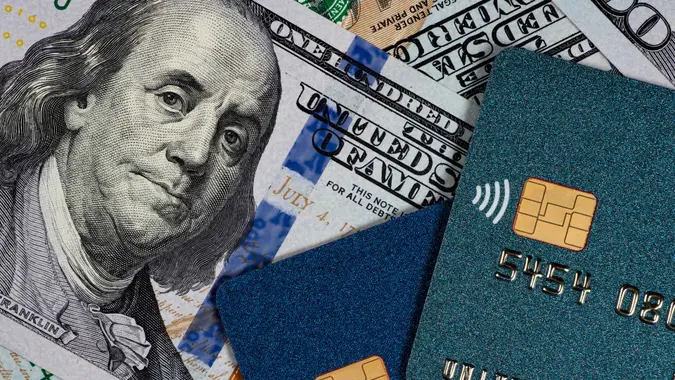Entrepreneurs Recommend Their Favorite Small Business Credit Cards

Commitment to Our Readers
GOBankingRates' editorial team is committed to bringing you unbiased reviews and information. We use data-driven methodologies to evaluate financial products and services - our reviews and ratings are not influenced by advertisers. You can read more about our editorial guidelines and our products and services review methodology.

20 Years
Helping You Live Richer

Reviewed
by Experts

Trusted by
Millions of Readers
Update: Some offers mentioned below may have changed or are no longer available. View current credit card offerings from our partners at CardCritics here or on the issuer’s website.


Chase Ink Business Preferred Card
- Purchase APR: 16.74% to 21.74% based on creditworthiness
- Intro APR: 16.74% to 21.74% based on creditworthiness
- Annual Fee: $95
Credit Card Benefits: Among other benefits, this card offers great introductory rewards, like 80,000 bonus points for new cardholders who spend $5,000 within the first three months of opening an account. Those points can be converted to $800 cash or up to $1,000 in travel rewards. Chase Ink also offers three points for every dollar spent (up to $150,000 annually) on certain categories, including internet, cable and phone services and social media and search engine advertising, and one point for every dollar spent in other categories.
Drawbacks: CEO Mike Scanlin recently opened a Chase Ink card for his business, which centers on the investing site, Born To Sell. But he's not necessarily loyal to any one credit card company.
"A negative is that there is a $95 yearly fee, but I'll do way more than that each year with the cash back," Scanlin said. "I get a new card about once every three years because the incentives make it worthwhile to do so. Why not take a few thousand in cash back and bonuses for doing what I'm already doing, but just changing the payment method?"
Related: Business Loan or Business Credit Card — Which is Better?

American Express Business Gold Rewards Card
- Purchase APR: None because cardholders pay their balance in full. The card does offer a "Pay Over Time" feature that can result in variable interest charges.
- Intro APR: See above.
- Annual Fee: None for the first year, $175 after that.
Credit Card Benefits: "I found having the Amex Gold business card really kept me watching cash flows ... and probably saved my small business tens of thousands of dollars in credit card interest fees," said Lauren Elward, CEO of the online ink and toner supplier Castle Ink. "An additional perk was racking up all the Amex reward points, which we used to purchase gift cards for contests as well as gift cards for personal expenses."
The card offers one to three points per dollar spent, depending on the purchase category, and a 50,000-point sign-up bonus for new cardholders who spend $5,000 in qualifying purchases within the first three months of opening an account.
Drawbacks: This card has a relatively high annual fee after the free introductory offer expires. Also, not every cardholder is eligible for the "Pay Over Time" option, so this might not be a good choice for business owners who don't plan to pay their balances in full each month.

American Express Business Platinum Card
- Purchase APR: None because cardholders pay their balance in full. The card does offer a "Pay Over Time" feature that can result in interest charges.
- Intro APR: See above
- Annual Fee: $450
Credit Card Benefits: This American Express card offers an enrollment bonus of 50,000 points for new cardholders who spend $10,000 in qualifying purchases in the first three months. They can earn an additional 25,000 points if they spend another $10,000 in their first three months as account holders. Elward's company, Castle Ink, also opened one of these Amex accounts when the signup bonus was even bigger.
"We've been very pleased with the level of service from Amex and particularly their fraud prevention," Elward said. "On several occasions they proactively reached out about what were fraudulent charges and saved us from considerable headaches."
Drawbacks: The card offers one to five points per dollar spent, depending on the category, and a number of other travel-related perks. But the hefty $450 annual fee means this card probably isn't worth it for business owners who aren't frequent flyers.
Corporate vs. Business Credit Cards: Which Is Best for Your Bottom Line?

Capital One Spark Business Miles or Cash Card
- Purchase APR: 17.74%
- Intro APR: 17.74%
- Annual Fee: None for first year, $59 after that
Credit Card Benefits: Capital One offers several options under its Spark brand. The main difference between its Spark Miles and Spark Cash cards is that the former offers 2 miles per dollar on all purchases and the latter offers 2 percent cash back. Both offer cash or miles bonuses worth the equivalent of $500 if a new cardholder charges $4,500 within the first three months of opening an account.
Drawbacks: Cash-back cards can be attractive, but cards that offer miles often offer more bang for the buck, says Allen Walton, founder of SpyGuy Security. Walton carries about a dozen cards and uses them in different circumstances to optimize their benefits.
"Business credit cards can give you points for your spend, or a percent cash back," he said. "Many business owners opt for the cash, although that's not the right choice for everyone. The value you get in hotel and airline miles from using a rewards card can far exceed whatever cash you're getting back with another card."

Chase United MileagePlus Club Card
- Purchase APR: 16.74% to 23.74% variable APR depending on creditworthiness
- Intro APR: 16.74% to 23.74% variable APR
- Annual Fee: $450
Credit Card Benefits: Nathan Miller, founder and president of the cloud-based real estate software company Rentec Direct, says one of the financial benefits of business credit cards is that the rewards earned don't count as taxable income. He favors the United MileagePlus Club Card because it offers travel-related perks and earns 2 miles for every dollar spent on United Airlines tickets and 1.5 points for each dollar spent on other purchases. The card also offers a $100 statement credit that new cardholders will receive after charging their first purchases.
"Plus, while traveling I get unlimited access to United Clubs, which makes travel much more comfortable, not to mention the free food," Miller said.
Drawbacks: The card does have a high $450 annual fee. But Miller says "the personal benefits I get from the card far outweigh the fee. Plus, the fee is paid by the business and is therefore a deductible business expense."
The best airline credit card could depend on where you are located. Other airline cards to consider include the CitiBusiness AAdvantage Platinum Select Card or the Southwest Rapid Rewards Premier Card.
"I use the United card because I live near a United hub," Miller said. "If you live near a different airline's hub, I would recommend investigating their premier miles card rather than United's to get the maximum travel benefit."
 Written by
Written by 























